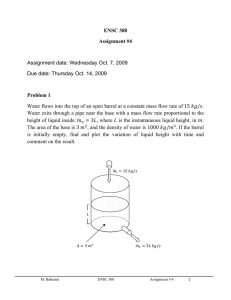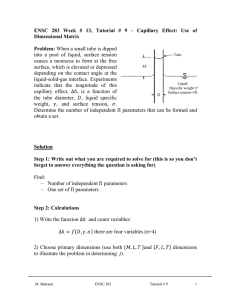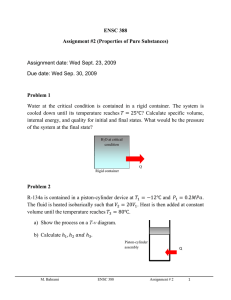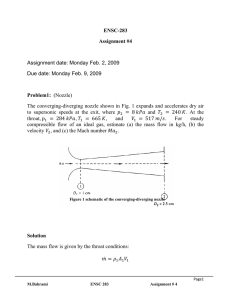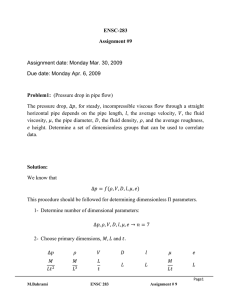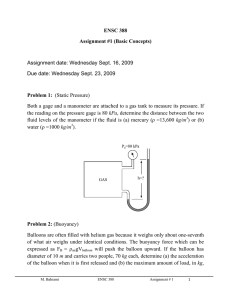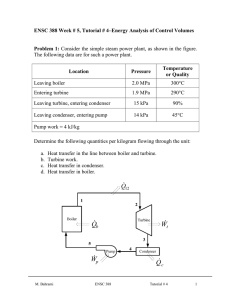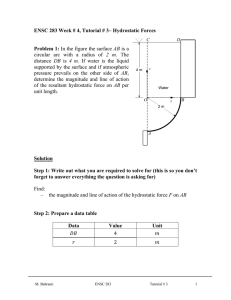ENSC 388 Assignment #4 Problem 1 Assignment date: Wednesday Oct. 7, 2009
advertisement
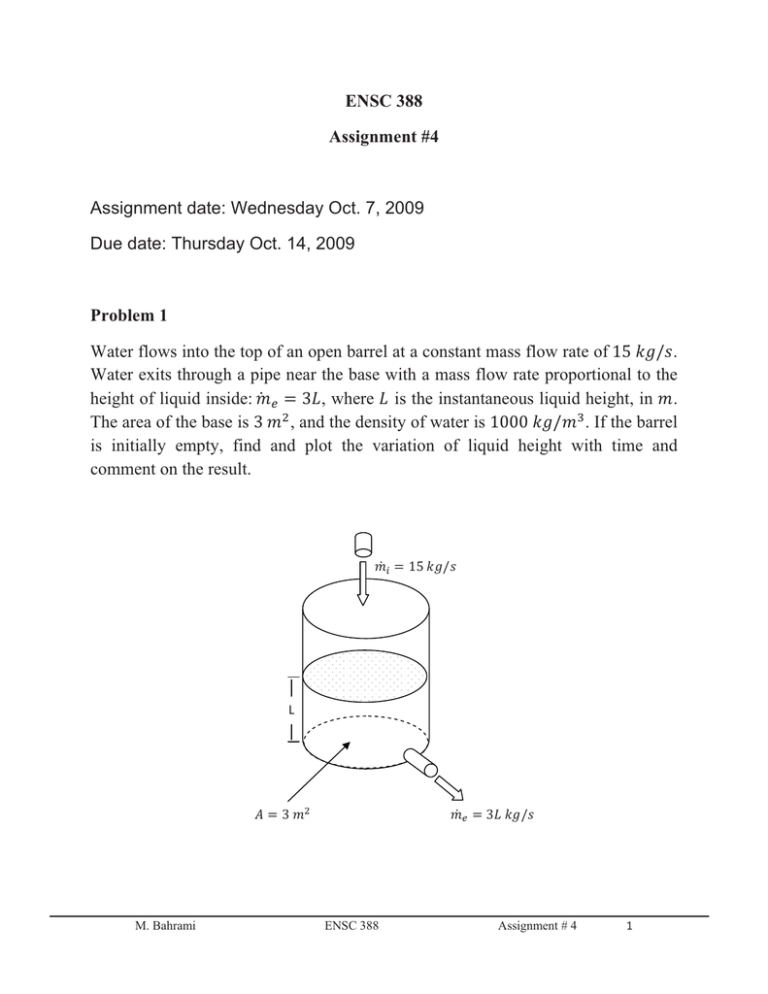
ENSC 388 Assignment #4 Assignment date: Wednesday Oct. 7, 2009 Due date: Thursday Oct. 14, 2009 Problem 1 Water flows into the top of an open barrel at a constant mass flow rate ofͳͷ݇݃Ȁݏ. Water exits through a pipe near the base with a mass flow rate proportional to the height of liquid inside:݉ሶ ൌ ͵ܮ, where ܮis the instantaneous liquid height, in ݉. The area of the base is ͵݉ଶ , and the density of water is ͳͲͲͲ݇݃Ȁ݉ଷ . If the barrel is initially empty, find and plot the variation of liquid height with time and comment on the result. ݉ሶ ൌ ͳͷ ݇݃Ȁݏ L ܣൌ ͵݉ଶ M. Bahrami ݉ሶ ൌ ͵݃݇ ܮȀݏ ENSC 388 Assignment # 41 Problem 2 An industrial process discharges ʹ ൈ ͳͲହ ݂ ݐଷ Ȁ݉݅݊ of gaseous combustion products at ͶͲͲԬǡ ͳܽ݉ݐǤ As shown in the figure, a proposed system for utilizing the combustion products combines a heat-recovery steam generator with a turbine. At steady state, combustion products exit the steam generator at ʹͲԬǡ ͳܽ ݉ݐand a separate stream of water enters at ͶͲ݈ܾ݂Ȁ݅݊ଶ ǡ ͳͲʹԬ with a mass flow rate ofʹͷ݈ܾȀ݉݅݊. At the exit of the turbine, the pressure is ͳ݈ܾ݂Ȁ݅݊ଶ and the quality isͻ͵Ψ. Heat transfer from the outer surfaces of the steam generator and turbine can be ignored, as can the changes in kinetic and potential energies of the flowing streams. There is no significant pressure drop for the water flowing through the steam generator. The combustion products can be modeled as air as an ideal gas. a) Determine the power developed by the turbine, in ݑݐܤȀ݉݅݊Ǥ b) Determine the turbine inlet temperature, in ԬǤ c) Evaluating the power developed at ̈́ͲǤͲͺܹ݇ݎ݁Ǥ ݄ǡ which is a typical rate for electricity, determine the value of the power, in ̈́Ȁݎܽ݁ݕ, for 8000 hours of operation annually. ܲଵ ൌ ͳܽ݉ݐǢܶଵ ൌ ͶͲͲԬ ሺܸܣሻଵ ൌ ʹ ൈ ͳͲହ ݂ ݐଷ Ȁ݉݅݊ 1 Steam Generator Turbine 2 4 ܲଶ ൌ ͳܽ݉ݐǢܶଶ ൌ ʹͲԬ Powerout 5 ܲଷ ൌ ͶͲ݈ܾ݂Ȁ݅݊ଶ Ǣܶଷ ൌ ͳͲʹԬ ݉ሶଷ ൌ ʹͷ݈ܾȀ݉݅݊ M. Bahrami ܲହ ൌ ͳ ݈ܾ݂Ȁ݅݊ଶ Ǣݔହ ൌ ͻ͵Ψ 3 ENSC 388 Assignment # 42 Problem 1: Known: ݏ݊݅ݏ݈݊݁݉݅݀݁ݎݎܽܤ ݐ݊ܽݐݏ݊ܿݏ݅݁ݐܽݎݓ݈݂ݏݏݏܽ݉ݐ݈݁݊ܫ ܱ݈݁ݎݎܾ݄ܽ݁ݐ݊݅݀݅ݑݍ݈݂݅ݐ݄݄݄݃݅݁݁ݐݐ݈ܽ݊݅ݐݎݎݏ݅݁ݐܽݎݓ݈݂ݏݏܽ݉ݐ݈݁ݐݑ Find: - Plot of liquid height variation with time and comment. Assumptions: - The water density is constant. Boundary of control volume ݉ሶ ൌ ͳͷ ݇݃Ȁݏ L ܣൌ ͵ ݉ଶ M. Bahrami ENSC 388 ݉ሶ ൌ ͵݃݇ ܮȀݏ Assignment # 43 Analysis: Conservation of mass in the control volume: ݀݉ ൌ ݉ሶ െ ݉ሶ ݀ݐ The mass of water contained within the barrel at time ݐis given by: ݉ ሺݐሻ ൌ ߩܮܣሺݐሻ where ߩ is density, ܣis the area of the base, and ܮሺݐሻ is the instantaneous liquid height. Substituting this into the mass rate balance together with the given mass flow rates: ݀ሺߩܮܣሻ ൌ ͳͷ െ ͵ܮሺݐሻ ݀ݐ Since density and area are constant, this equation can be written as: ͵ ͳͷ ݀ܮሺݐሻ ൬ ൰ ܮൌ ߩܣ ߩܣ ݀ݐ which is a first-order, ordinary differential equation with constant coefficients. The solution is: ܮሺݐሻ ൌ ͷ ݔ݁ܥ൬െ ͵ݐ ൰ ߩܣ where ܥis a constant of integration. The solution can be verified by substituting into the differential equation. To evaluateܥ, use the initial condition:ܽ ݐݐൌ Ͳǡ ܮൌ Ͳ. Thus, ܥൌ െͷand the solution can be written as: ܮሺݐሻ ൌ ͷ ͳ െ ݁ ݔ൬െ ͵ݐ ൰൨ ߩܣ Substituting ߩ ൌ ͳͲͲͲ݇݃Ȁ݉ଷ and ܣൌ ͲǤ͵݉ଶ results in: M. Bahrami ENSC 388 Assignment # 44 ܮሺݐሻ ൌ ͷሾͳ െ ݁ݔሺെͲǤͲͳݐሻሿ This relation can be plotted by hand or using appropriate software. The result is: 6 5 Height, m 4 L is nearly constant 3 2 1 0 0 250 500 750 1000 Time, s From the graph, we see that initially the liquid height increases rapidly and then levels out. After aboutͷͲͲݏ, the height stays nearly constant with time. At this point, the rate of water flow into the barrel nearly equals the rate of flow out of the barrel. From the graph, the limiting value of ܮisͷ݉. Which also can be verified by taking the limit of the analytical solution as ݐ՜ λ. M. Bahrami ENSC 388 Assignment # 45 Problem 2: Known: ܵ݉݁ݐݏݕݏ݄݁ݐݎ݂݀݁݀݅ݒݎ݁ݎܽܽݐܽ݀݃݊݅ݐܽݎ݁݁ݐܽݐݏݕ݀ܽ݁ݐ Find: - Power developed by the turbine. - Turbine inlet temperature. - Evaluating annual value of the power developed. ܲଵ ൌ ͳܽ݉ݐǢܶଵ ൌ ͶͲͲԬ ሺܸܣሻଵ ൌ ʹ ൈ ͳͲହ ݂ ݐଷ Ȁ݉݅݊ 1 C.V. Turbine 2 4 ܲଶ ൌ ͳܽ݉ݐǢܶଶ ൌ ʹͲԬ Powerout 5 ܲଷ ൌ ͶͲ݈ܾ݂Ȁ݅݊ଶ Ǣܶଷ ൌ ͳͲʹԬ ݉ሶଷ ൌ ʹͷ݈ܾȀ݉݅݊ ܲହ ൌ ͳ ݈ܾ݂Ȁ݅݊ଶ Ǣݔହ ൌ ͻ͵Ψ 3 Assumptions: - The control volume shown in dashed line is at steady state. Heat transfer is negligible. Changes in kinetic and potential energy can be ignored. There is no pressure drop for water flowing through the steam generator. The combustion products are modeled as air as an ideal gas. M. Bahrami ENSC 388 Assignment # 46 Analysis: (a) The power developed by the turbine is determined from a control volume enclosing both steam generator and the turbine. Since the gas and water streams do not mix, mass rate balances for each of streams can be written: ݉ሶଵ ൌ ݉ሶଶ ݉ሶଷ ൌ ݉ሶହ The steady state form of the energy rate balance is: ܸଵଶ ܸଷଶ ݃ݖଵ ቇ ݉ሶଷ ቆ݄ଷ ݃ݖଷ ቇ Ͳ ൌ ܳሶ െ ܹሶ ݉ሶଵ ቆ݄ଵ ʹ ʹ ܸଶଶ ܸହଶ ݃ݖଶ ቇ െ ݉ሶହ ቆ݄ହ ݃ݖହ ቇ െ ݉ሶଶ ቆ݄ଶ ʹ ʹ Terms containing kinetic and potential energies, మ ଶ ݃ݖ , drops out by assumptions. ܳ is also zero since there is no heat transfer. With these simplifications, together with the above mass flow rate relations, the energy rate balance becomes: ܹሶ ൌ ݉ሶଵ ሺ݄ଵ െ ݄ଶ ሻ ݉ሶଷ ሺ݄ଷ െ ݄ହ ሻ The mass flow rate ݉ሶଵ can be evaluated with the given data at inlet 1 and the ideal gas equation of state: ݉ሶଵ ൌ ሺ ܸܣሻଵ ܲଵ ሺܴതȀܯሻܶଵ Using Table A-1E, ܯൌ ʹͺǤͻ݈ܾ݉Ȁ݈ܾ݉ ݈: ݂ ݐଷ ݈ܾ݂ ൨ ൈ ͳͶǤ ଶ ൨ ͳͶͶሾ݅݊ଶ ሿ ݈ܾ ݉݅݊ ݅݊ ݉ሶଵ ൌ ቆ ቇ ൌ ͻʹ͵ͲǤ ൨ ݂ݐǤ ݈ܾ݂ ݉݅݊ ͳሾ݂ ݐଶ ሿ ൨ ͳͷͶͷ ݈ܾ݈݉Ǥ ιܴ ൈ ͺͲሾιܴሿ ݈ܾ݉ ʹͺǤͻ ቂ ቃ ݈ܾ݈݉ ʹ ൈ ͳͲହ M. Bahrami ENSC 388 Assignment # 47 The specific enthalpies ݄ଵ and ݄ଶ can be found from Table A-17E: At ͺͲιܴǡ ݄ଵ ൌ ʹͲǤͶݑݐܤȀ݈ܾ݉ and at ʹͲιܴǡ ݄ଶ ൌ ͳʹǤ͵ͻݑݐܤȀ݈ܾ݉. At state 3, water is a liquid. Since at ܶଷ ൌ ͳͲʹǡ ԬǢ ܲଷ ൌ ͳ݈ܾ݂Ȁ݅݊ଶ : ݄ଷ ൌ ̷݄ଵଶԬ ݒ̷ଵଶԬ ሺܲଷ െ ܲ௦௧̷ଵଶԬ ሻ ݑݐܤ ݂ ݐଷ ݈ܾ݂ ݈ܾ݂ ݑݐܤ ݄ଷ ൌ ͺǤͲ͵ ൨ ͲǤͲͳͳ͵ ቈ ൈ ൬ͶͲ ଶ ൨ െ ͳ ଶ ൨൰ ȀͷǤͶ ݈ܾ݂ ଷ ݈ܾ݉ ݈ܾ݉ ݅݊ ݅݊ ݂ݐ ݅݊ଶ ݑݐܤ ՜ ݄ଷ ൌ ͺǤͳ ൨ ݈ܾ݉ State 5 is a two-phase liquid-vapour mixture. With data from Table A-5E, and given quality: ݄ହ ൌ ̷݄ଵ௦ ݔହ ̷݄ଵ௦ ݑݐܤ ݑݐܤ ݑݐܤ ൨ ͲǤͻ͵ ൈ ͳͲ͵ͷǤ ൨ ൌ ͳͲ͵͵Ǥʹ ൨ ՜ ݄ହ ൌ ͻǤ ݈ܾ݉ ݈ܾ݉ ݈ܾ݉ Substituting values into the expression forܹሶ : ݈ܾ ݑݐܤ ݑݐܤ ݈ܾ ൨ ൈ ൬ʹͲǤͶ ൨ െ ͳʹǤ͵ͻ ൨൰ ʹͷ ൨ ݉݅݊ ݈ܾ݉ ݈ܾ݉ ݉݅݊ ݑݐܤ ݑݐܤ ݑݐܤ ൈ ൬ͺǤͳ ൨ െ ͳͲ͵͵Ǥʹ ൨൰ ൌ ͶͻͳͲ ൨ ݈ܾ݉ ݈ܾ݉ ݉݅݊ ܹሶ ൌ ͻʹ͵ͲǤ (b) To determineܶସ , it is necessary to fix the state at 4. This requires two independent property values. With forth assumption, one of the properties is pressure, ܲସ ൌ ͶͲ݈ܾ݂Ȁ݅݊ଶ . The other is specific enthalpy݄ସ , which can be found from an energy rate balance for a control volume enclosing just the steam generator. Mass rate balances for each of the two streams give ݉ሶଵ ൌ ݉ሶଶ ܽ݊݀݉ሶଷ ൌ ݉ሶସǤ With the third assumption and these mass flow rate relations, the steady state form of energy rate balance reduces to: M. Bahrami ENSC 388 Assignment # 48 Ͳ ൌ ݉ሶଵ ሺ݄ଵ െ ݄ଶ ሻ ݉ሶଷ ሺ݄ଷ െ ݄ସ ሻ Solving for݄ସ : ݄ସ ൌ ݉ሶଵ ሺ݄ െ ݄ଶ ሻ ݄ଷ ݉ሶଷ ଵ ݈ܾ ቃ ͻʹ͵ͲǤ ቂ ݉݅݊ ൬ʹͲǤͶ ݑݐܤ൨ െ ͳʹǤ͵ͻ ݑݐܤ൨൰ ͺǤͳ ݑݐܤ൨ ݄ସ ൌ ݈ܾ ݈ܾ݉ ݈ܾ݉ ݈ܾ݉ ʹͷ ቂ ቃ ݉݅݊ ݑݐܤ ݑݐܤ ՜ ݄ସ ൌ ͳʹͳ͵Ǥ ൨ ̷݄ସ௦ ൌ ͳͳͻǤͺ ൨ ݈ܾ݉ ݈ܾ݉ Since state 4 is superheated vapour, Table A-6E should be used. Interpolating atܲସ ൌ ͶͲ݅ݏ, we get ܶସ ൌ ͵ͷͶԬ. (c) Using the result of part (a), together with given economic data and appropriate conversion factors, the value of the power developed for 8000 hours of operation annually is: Ͳሾ݉݅݊ሿ ݑݐܤ ൨ൈ ݈ܽݒ݈ܽݑ݊݊ܣǤ ൌ ቌͶͻͳͲ ݉݅݊ ͳሾ݄ݎሿ ൈ ݄ݎ ͳሾܹ݇ ሿ ̈́ ̈́ ൬ͺͲͲͲ ൨൰ ቆͲǤͲͺ ቈ ቇ ൌ ͷͷͺǡͲͲͲ ቈ ݑݐܤ൱ ݎݕ ܹ݇Ǥ ݄ݎ ݎݕ ቃ ͵Ͷͳ͵ ቂ ݄ݎ Note (1): Alternatively, to determine state 4, a control volume enclosing just the turbine can be considered. M. Bahrami ENSC 388 Assignment # 49
